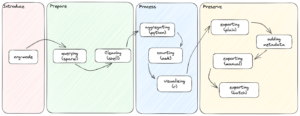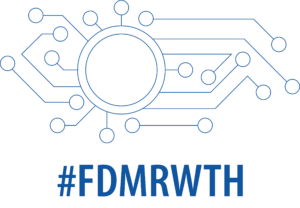
Workflow of a data set processed by Lukas C. Bossert and Jonathan Hartman at EmacsConf 2023 using Emacs and org-mode.
Source: IT Center
Research without digital data has long since become unthinkable. Many different tools and programs are sometimes used to collect, process and organize data. The programs differ not only due to different subject areas and data types, but also with regard to the respective phase within the research data life cycle: starting with data collection, through its cleansing and analytical processing, to the publication-ready output of the data including documentation.
Research Data Management With Emacs and the Org-Mode Extension
A suitable program is Emacs, which is not only available to everyone as “free software”, but is also excellently suited for working with data via extensions (such as org-mode). The community of the program, which has been around for more than 40 years, is very active, which is not only reflected in its continuous further development, but also in an annual international conference.
The org-mode extension is based on plain text and can be customized. It is well suited for scientific text production and general organization. For example, project management, agenda creation, journals, personal knowledge management and presentations can be written and managed in org-mode. However, the main focus is on so-called literary programming. An example of this was presented at the EmacsConference 2023 by RWTH Aachen University.
RWTH Aachen Contribution as Highlight 2023
For the 2023 digital conference, Lukas C. Bossert and Jonathan Hartman (both from the Research Process and Data Management (RPDM) department) have submitted a paper entitled “Collaborative data processing and documenting using org-babel“, in which they show how to effectively collect, process and export data using Emacs and org-mode.
The starting point of the data process chain is a dataset in Wikidata via the National Research Data Infrastructure, which is processed in several steps.
This approach is linked to the concept of “literary programming”. Here, the program logic is embedded in the human text, which is implemented with the help of the “org-babel” package in Emacs. This has the advantage that the code itself is documented and is also extremely useful for understanding how the program works.
It is pleasing that the ITC’s contribution even made it into the highlights of the official EmacsConf 2023 report. For example, one of the published feedback comments praised it: “Truly one of the most impressive talks of the day. Congrats! Very inspiring.”
The two-day conference featured almost 50 talks, ranging from introductions to specific ways of working, to applications in science and other fields, to modifications and the development of Emacs itself.
Learn More
If you have any questions about the conference or RDM in general, simply contact the IT-ServiceDesk. The RDM team looks forward to hearing from you.
Responsible for the content of this article is Katharina Grünwald .





Leave a Reply
You must be logged in to post a comment.